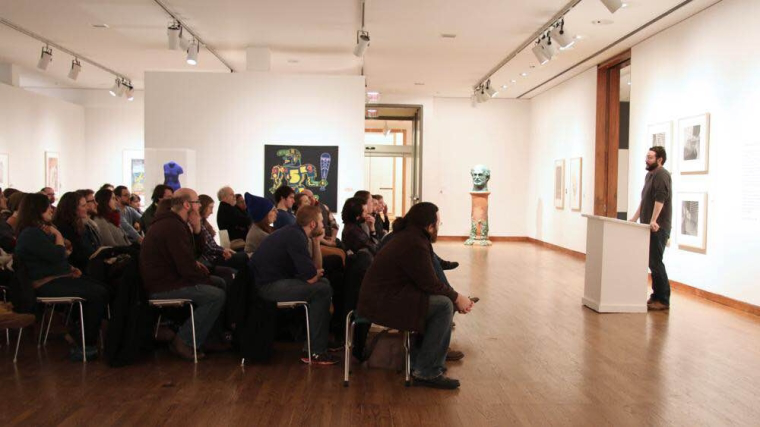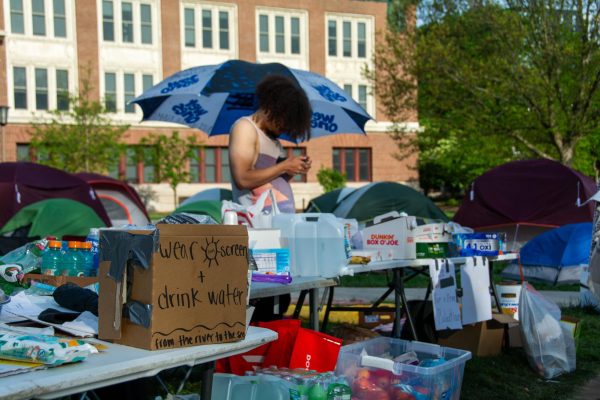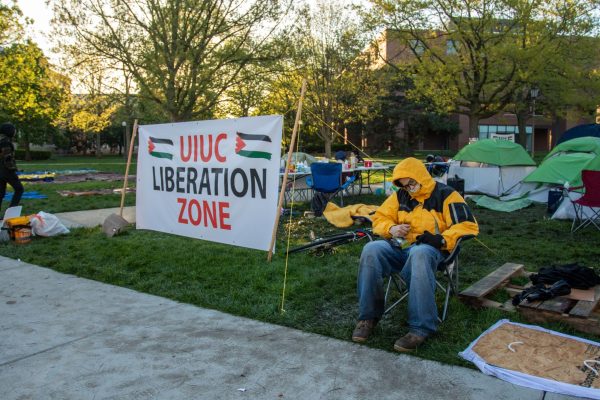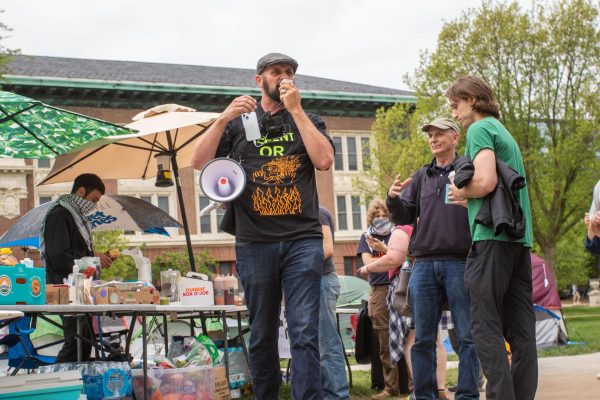Risking it all through creative writing
Caleb Curtiss, a guest reader at the Voice Reading Series in February, stands in front of an audience at the Krannert Art Museum on Feb. 5. The next reading series will be held on Thursday.
March 5, 2015
Alison Syring Bassford remembers sitting behind a desk, working an average office job as a technical writer in Washington, D.C., and feeling something was missing.
“I didn’t like it,” said Bassford, graduate student in LAS. “The jobs didn’t care so much about independent or creative thinking. That was really boring for me. I just knew that I had to get out.”
She has turned to the creative contents of her notebook ever since.
This Thursday, Bassford will share these works with an audience for the first time at the Krannert Art Museum’s Voice Reading Series.
“I’ve always loved writing, but I was intimidated by the creative writers. I would take classes with them, read their writing and think that nothing I wrote could ever survive the criticism,” she said. “But the more I thought about doing creative writing, I just really had to go out there and do it. People telling me that they like something about it made me feel a lot more confident.”
Get The Daily Illini in your inbox!
Since the series’ start nearly a decade ago, Jodee Stanley, director of the creative writing program, said the series allows creative writing majors to do just that: seek feedback on their work in areas outside of the classroom.
“The series was organized as a venue for our creative writing grad students to showcase their writing talents,” Stanley said. “And (it) gives them experience reading their work in front of an audience, which is an important skill to have as a professional writer.”
Sara Fan, a graduate student in LAS who organized this year’s event, believes the Voice Reading Series allows audiences to experience works in a brand new way.
“Our writing is meant to be heard and read by others,” Fan said. “It adds another dimension. It’s also exciting to hear new work that might still be in progress or evolving. You sort of get a sneak peek before it’s published.”
But most importantly, Stanley believes the series allows audiences to rediscover the importance of literature and creative writing as a career path.
“Literature, like other forms of creative expression, is not just a form of entertainment, but is also a way for us to contemplate ideas, questions and our experiences as human beings,” Stanley said. “Reading gets us out of our own heads and allows us to think about the world around us.”
For Bassford, learning to be confident about her creative works was only half the problem; the rest came from her parents’ apprehension about pursuing it.
“My parents wanted me to have a job and be successful. They were surprised because I had a stable job in D.C., and I was quitting and moving across the country (because) I got into this program,” Bassford said. “They thought, ‘What are you going to do with that?’ They read my writing, and they like it, but there’s a lot of belief that it isn’t really a job.”
When Bassford took the risk, she learned a lesson that irrevocably changed her life.
“I made good money, and it was great, but I’d rather be happy than make a lot of money,” Bassford said. “If I gave up creative writing for the job, it would be a struggle. I don’t want to do anything that isn’t going to be fun or appealing in any way. I think if I could have a job that allows the most writing time possible, that would be the best.”
Michael Hurley, another graduate student in LAS who will be reading this Thursday, has learned that money is not as important as his poetry.
“I don’t want money. It’s a means to an end. I want to write. I want to make things, not buy things, and I just need to make enough to be able to have some spare time to write in. I think it’s really strange that doing what you love is something you have to defend to other people,” Hurley said. “In creative writing, there are no rules, just the blank page. It’s the only thing I’ve always loved doing. It’s my favorite way to spend my time. Poetry has always been there.”
Bassford hopes to teach the University community that humanities and creative writing programs have just as much importance as science and math-based majors.
“Everyone is in engineering, economics or business, and I definitely realize that everyone has their strengths and interests, but I also think that sometimes the creativity in those fields is ignored,” Bassford said. “If I think about my jobs in the past, when I was allowed to be more creative, I was a more successful employee. Even if you are a chemical engineer, if you take a creative writing workshop, you might learn something about yourself that you didn’t know before.”
But in the end, as Bassford prepares to step up to the podium and share her work with others, she forgets the complications of her major and focuses on the reasons why she loves it. Her major gives her a chance to entertain and exercise her creative brain at the same time.
“I learned a lot about myself through accepting criticism and letting it help me and develop myself and my writing more,” Bassford said. “To produce something I’m happy with and share it with other people who see positive things in it — I didn’t feel like I was able to do that when I was working a regular job.”







